What are Common Symptoms of Anxiety?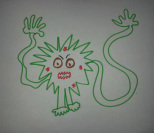 An elementary aged child was asked to think about her anxious symptoms and worry thoughts and turn them into a cartoon character. This is what she created. Pretty scary stuff! Keep reading to see how this scary picture and others like it can be used in therapy to help children (and brave adults) gain power over their feelings and calm down the brain's limbic system. Eye Movement Desensitization and Reprocessing (EMDR), meditation and other modalities can help create calm as well. Anxiety looks very different from one person to the next. In some, it is an almost constant buzzing, in others it presents as sweaty, heart racing panic attacks. Some report not being able to enjoy social functions and others cry uncontrollably. Worry thoughts can be common as well as harmful debilitating self talk. Anxiety, no matter its form, is uncomfortable and something we see at The Center every day. Too Busy & Driven? Not Living Mindfully can be a Common Cause of AnxietyAnxiety can come from many different sources. Northern Virginia is a perfect breeding ground for anxiety. We work hard long hours alongside others who work just as hard. We are an intelligent population with intelligent, driven successful peers. Sometimes ambition, competition, and the comparisons we do to stay ahead and crisp, can keep us out of touch with ourselves and with what keeps us grounded. Not caring for oneself can be quickly depleting. Not measuring up or feeling "if I just did…" can leave one constantly looking ahead instead of being present and enjoying small moments in life. When we stop being present and are not choosing our life choices mindfully, we begin to feel an inner incongruence. This dissonance and inner conflict can manifest itself as anxiety. What are we Modeling for our Children? Anxiety and Your Child...Many of the children we see who struggle with anxiety seem to be wired for perfection or performance. Wanting to do it "right" or "perfect" can be a trait we teach our children silently. Our children have our genetic coding and predispositions, but they also watch us and learn how to navigate life and life choices without a word needing to be shared. Not all anxiety in children and adults is learned. Some feel vulnerable after a painful experience or trauma and channel the emotions into anxiety. Some experience a tremendous amount of worry thoughts that take up way too much brain space and begin to interfere with focus and daily happiness. The habit of internalizing negative experiences can lead to chronic anxiety and can be dangerous. Stopping it before it does real damage is the key. Infection Induced AnxietyWe do not just have ambition and drive in NOVA, we have ticks…and lots of them! Ticks carry more than Lyme Disease. Bartonella, Babesia and Mycoplasma are a few infections that can cause debilitating anxiety/depression and if left untreated can create significant neurological damage. Strep antibodies can also create panic and OCD in children and teens and in some cases, adults. This is known as PANDAS. When other agents create the anxiety, such as Chlamydia Pneumonia, it is referred to as PANS. When anxiety is intense and there does not seem to be a cause or known trigger, look to rule out infection as a potential influencer. Often physicians who present themselves as "Lyme Literate Doctors" are good specialist choices to visit. Diagnosing infection based anxiety is a process that relies on more information than blood tests alone. A thorough clinical assessment is highly recommended if you suspect infection based anxiety or panic. How to Cope with AnxietyThe first step in coping with anxiety is to understand its origin and to experience it for what it is. Sometimes people are quick to medicate anxiety without first exploring some of the above possibilities or going to the source itself to heal it. It is all too easy in our Northern Virginia culture to squelch the fires of anxiety by reaching for a beer or that second martini. Often screen time is used to melt away the feelings and distract the mind. Looking to the source can be painful, but useful. Is it Trauma? Fear? Are you losing touch with yourself and your loved ones? Could it be infection based? Look for the cause before reaching for a temporary fire extinguisher. When you know the cause, you can get assistance. If life is out of balance or you have unfinished emotional business to care for, therapy can help. If you need to find ways to calm your body and control your run away negative thoughts, counseling can help teach you these methods. Learning to listen to your negative self talk, turning it around and replacing it with healthy positive self talk can be empowering. Noticing how your body reacts to stress and emotional pain and what anxiety looks like in your body BEFORE it turns into panic can be an invaluable tool when learning to get ahead of panic attacks. Learning to take deep slow breaths to calm your heart and slow your thoughts can be key to reducing the symptoms of anxiety and decrease panic attacks. What Does Treatment for Anxiety Look Like?Adults can improve anxiety by learning the habits of Mindfulness and by practicing the tangible skills taught in Cognitive Behavioral Therapy (CBT). Our therapists are trained to help teach and monitor these skills. Sometimes, though the anxiety is embedded in trauma or is creating too much hyperarousal (extreme buzzing and almost non-stop physical symptoms) that CBT feels like putting a bandaid on a gushing wound. In cases like these, EMDR, Meditation/Visualizations, Art Therapy, Sand Tray or Play Therapy may be a better option to first calm the limbic system part of the brain so that the cognitive, more rational part of the brain can be accessed. Going to the cognitive brain first when someone is in a state of hyperarousal can be often be a mistake and can create frustration in the one suffering. Using methods such as relaxation, EMDR or Creative type therapies can calm the body and mind and help create a foundation for CBT skills to then root beneath. Our clinicians are trained in these modalities and can help from age 3 through adulthood. To request an appointment or for more information, click here. Creative Therapy Approaches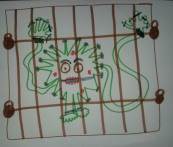 One method to calm the limbic system and create empowerment over anxiety and other traumas is the use of a drawing series. Let's look back at the cartoon character above. In the series shown here, a young girl was asked to sit in the anxiety and create a cartoon character that embodied all of it. The next step is to have her get inside of herself and determine how she feels within her body and where she feels each emotion when she is within proximity of this creature (this is another picture not shown0. The third step is to make her face the anxiety and begin to feel empowered over it. She is now asked to do what ever she feels compelled to do to the character itself. This child chose to put her anxiety monster in jail (called encapsulation), lock up it's hands, feet and fingers, lock the jail in four places, gag it's mouth, soften it's prickliness and re-shape it's eye brows. We then check back in with the child to see how she is feeling. When children and adults are asked to approach their trauma or scariness head on and then learn to become empowered over it, the trauma/anxious feelings decrease and the empowerment increases. Some clients need to do more than one drawing series, while others choose another modality to continue to calm the limbic system. EMDR participants experience a similar experience as those who create via art. It seems to be about finding a safe way to revisit something uncomfortable…to sit with the scary and BE OKAY. I have had some adults brave enough to try this drawing series with great success. Please. Do not try a series like this without proper training. The series is intensive and involves more pictures and steps than what are shown here today. Gabrielle Anderson is the Director and a Therapist at the Family Therapy Center of Northern Virginia, llc She and the other team members can be contacted directly from the Center's Meet the Team page.
0 Comments
This Blog Contains Sensitive Information That is not Suitable for Young Children. Reader: Beware of Mature, Anxiety Provoking Content. A now college aged student who we will call Anna remembers sexual abuse that occurred when she was a young child. Sexual advances made on her at a college party brought about a flood of memories from her childhood that had been repressed for almost a decade. Getting to trauma therapeutically can be tricky. Sometimes victims experience a flooding of emotion, stress hormones and disturbing memories throughout the therapeutic process. Expressive type therapies help control the volume of flooding and can enable the client to process through memories and emotions safer. Anna was especially brave and curious to try alternative methods of therapy. Throughout the process, as you will see, she utilizes art, sand, poetry, music and more to help her approach the memories and cleanse the experiences. We invite you to walk through some of her process with us… Sand Tray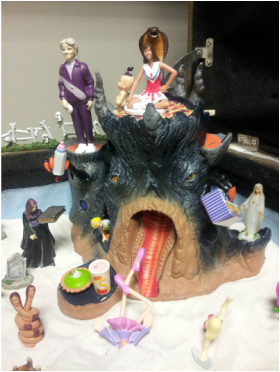 Anna’s family was religious. They were very much involved in their church and attended the same church since her mother was a teenager. Anna’s family knew her Sunday School teacher well and had been friends with him and his wife for years. Everyone thought the teacher’s love and dedication to the children was remarkable. What Anna never told anyone was that her teacher was secretly molesting her. Anna talked of his methods of “grooming” that helped him gain her trust. Grooming is a manner of manipulation that allows the perpetrator to specifically target what an individual needs in order to trust. It often confuses the relationship because victims often mistake grooming methods for love. Candies, cookies, gifts & religious figures were all used in her sand tray to show the grooming. He groomed her as well as her parents. Anna also represented the other girls she suspected may have been targets. Looking back, she could see how he treated other girls similarly. She choose to perch one girl upon the lava with a serpent unknowingly ready to strike her. Another was barely crawling out alive. Her teacher was now older and a grandfather. She placed his new granddaughter in the sand tray, on the monster, as a way to communicate her fear that she may become his victim as well. The little one is looking to his wife, her grandmother to protect her, yet Anna states his wife seemed either oblivious or numb to what was happening and never intervened to save her. Anna mentioned that when she became 14 years old, she apparently became “too old” for him thus spitting her out of his mouth. This powerful sand tray gave us rich information to explore and help her process. 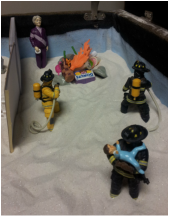 To show how a sand tray can help move clients through the healing process, here Anna is able to create a bonfire of all the grooming materials used to lure her into a trusting relationship. She has powerful firefighters coming in to rescue the children and bring them into safety AND to insure that the grooming materials continue to burn and stay contained in the fire itself. Kinetic sand trays like this can be very very empowering for clients to experience this type of control. Notice the Sunday school teacher's wife is still numb, looking off into space, still in denial that her husband could do such acts of pain and destruction. His wife's lack of response and protection is a source of of pain and betrayal for Anna that she is working through. Music TherapyMusic can be used by all ages to aid in healing trauma. Anna has always had a love for music, so using it as a way to help her heal and process seemed natural and organic. Throughout her therapeutic journey, Anna choose songs that spoke to where she was that week or month. The songs helped her make sense of her emotional journey. Some were used to cry out painful feelings (The Lonely: Christina Perri), others just made her sit in her pain and feel it (Elbow: Some Riot). Although this was a dark time of her recovery process, sometimes Anna needed to sit in the dark within the darkness of herself. Music kept her company and helped her organize the emotion. Some songs helped Anna say good-bye to her offender and make peace with the pain he caused others (Jar of Hearts: Christina Perry & Here Comes the Flood: Peter Gabriel). Though much of this purging took place at home, Anna brought her songs into the office and shared them during therapy. What a powerful powerful way for her to excrete her pain and navigate her every changing feelings. Poetry, Expressive Writing, Drawing & CollagingAnna took the time to write letters to her offender. These letters were never sent or mailed, but were for her process. She verbalized experiencing relief by putting some of her emotion on paper. Although Anna agreed to allow us to use much of her therapeutic process within this blog, the letters were too personal to share. Instead, she is sharing a creative depiction of what it felt like to be lured away from the safety of her biological and church family and left to pick up her own pieces. We feel privileged to have the permission to share this beautiful piece of poetic expression. Dancing with a Winged CreatureThe giggly chubby handed child runs after the beautiful butterfly. He is back for more fun and dancing. Chasing each other around the garden, the curly headed child unknowingly follows him out of the safety of her yard. Faster and faster, her little legs carry her. The winged creature glides through the sky, swooping down and around her. Swirling around and around with the magic and sparkle of tiny fairies. Farther and farther they run and chase and giggle and dance. Exhausted by her adventure, the little one stops to rest. The butterfly flies away. As she pauses, it becomes apparent that she no longer recognizes where she is. Tears begin to well up in her tiny little eyes as she searches the sky for her delightful friend. She scans the field for anything familiar. Soon he appears; her beautiful flying companion. Swooping down with deliberate speed, he dives in close enough for her tiny little hands to reach out and touch. But wait. Ouch! That hurt! That wasn’t a dance at all. She begins to cry again. This time tears of pain. Pain mixed with fear. What is that buzzing sound? What happened to the gentle soaring flutter? The winged creature rushes in for another prick, another poke, here and there; again and again. Numbness sets in as the toxins infuse her body. Why is he doing that? Where is the magic? She cries out for her parents. No one can hear her cries for help… no one can feel her anguish. Confused and stunned, the tiny little girl collapses to the ground and slumps down by a rock; with her head between her knees she begins to weep. Tears mixed with dust and sweat mingle and fall to the ground below her. She was seduced by the beauty of his wings and by the playful parade that led her away. She suddenly feels completely alone, isolated and afraid. As if paralyzed, the small child huddles frozen, in the middle of the field, unable to move. Unable to find safety. In the distance, she hears scurrying and hurried footsteps. Her head is too heavy to move, her neck too weary to twist. She slumps defenseless as the footsteps mix with frantic screams. She hears her name, but still can not move. Her parents frantically race to her side. Without looking up, she receives their embrace. Weeping, rocking, holding, protecting; her parents can hardly breath. No one can end the embrace. Huddled in a pool of tears, they stand and prepare to depart. The walk back home becomes a sober realization that love and fences and watchfulness are not enough. That the skies are full of beautiful magical creatures waiting to sprinkle fairy dust on our children. That all anyone can do is continue to love, continue to protect and continue to watch the skies for the eary sounds of buzzing. 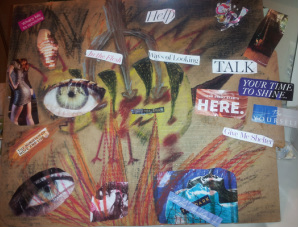 After writing expressively about the dangerous bee, Anna decided to draw a picture of it. It didn't take long before she felt the need to destroy it. You can feel the religious overtones within the collage drawing. Anna wanted him to be taken down by his own beliefs. A pitch fork, hell's flames and an open watchful eye helped diminish his powers. The bottom of the collage depicts the symptoms still evident while the right shows growth. Anna purposefully had the words and a staircase climbing off the side of the board to imply hope for the future. Though this is not an exhaustive collection of Anna's therapy and only shows the darker side of her treatment, we are grateful that she gave us permission to share what we have. It is our hope that by sharing examples of treatment, it will give you, a prospective client, a glimpse of what expressive therapy can look like and how it can help purge feelings and propel one forward without relying completely on talking. One does not need to experience trauma to become involved in expressive therapies. Anxiety, illness, transitions….any hurt can be examined and navigated via expressive therapy.
Gabrielle Anderson is the Director and a Therapist at the Family Therapy Center of Northern Virginia, llc She and the other team members can be contacted directly from the Center's Meet the Team page. This Blog Contains Sensitive Information That is not Suitable for Young Children. |
AuthorThese blog entries are written by our very own clinicians. When inspiration hits, another entry will be logged. Get Blog UpdatesWhat is an RSS FEEDER? If you click on the RSS Feeder, anytime a new blog entry is added to the website, you will be automatically notified of it. The only thing you need to do is get an RSS READER app. Chances are, if you click on the RSS Feeder, and you do not have a reader, it will take you directly to the app store so you can install one. It takes 60 seconds to get set up for auto notifications of new blogs sent directly to you!
Archives
May 2021
Categories
All
|


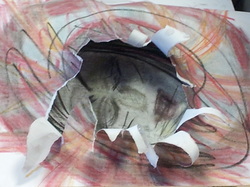

 RSS Feed
RSS Feed